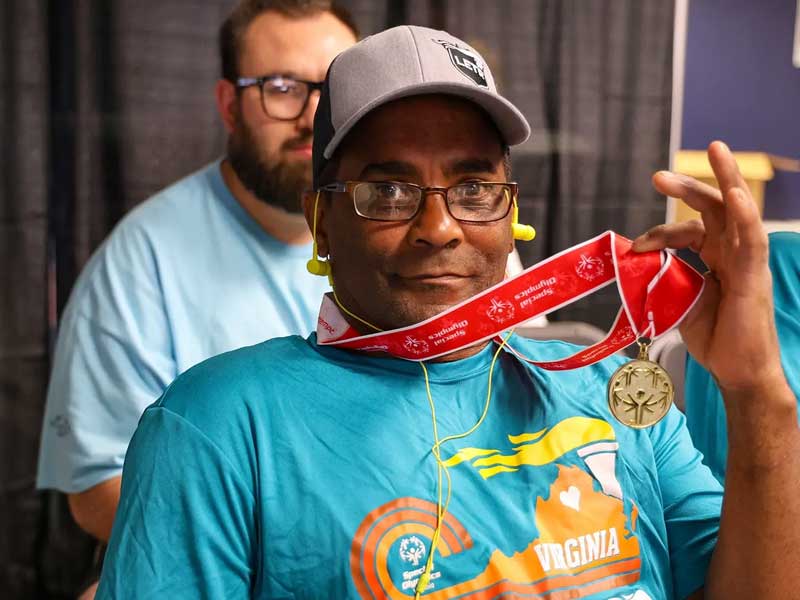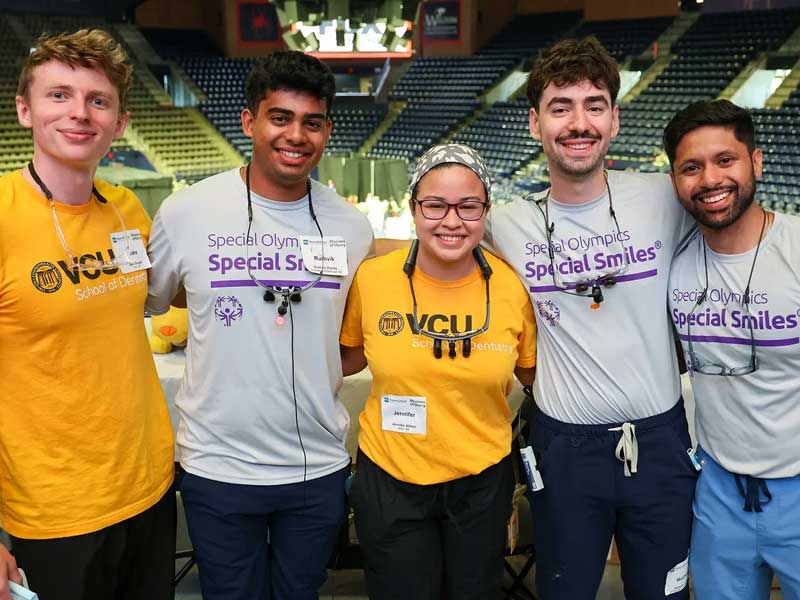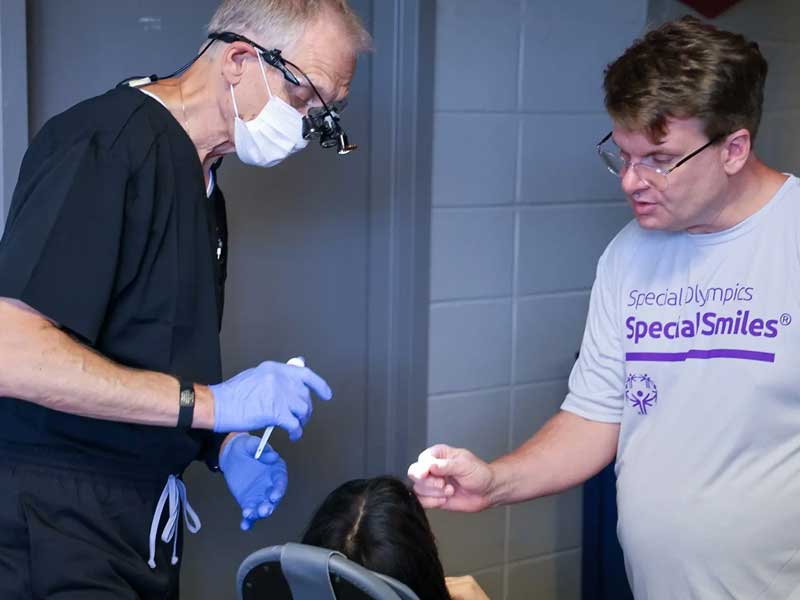For Robert Harris, the Special Olympics Virginia is an opportunity to feel the rush of competition and the pride of accomplishment. It’s also a chance to receive oral health care.
Nicknamed “The Hulk,” the Woodbridge man has participated in powerlifting at the Special Olympics Virginia for 20 years. His lengthy career has even taken him to the USA Games in 2022, where he won four silver medals.
At this year’s Virginia event, held in the Richmond area in early June, Harris participated in powerlifting as well as bowling, having trained for hours every week.
“It feels great to participate,” he said. “I like to keep myself healthy and take care of myself through sports. I also like meeting other athletes from different areas.”
But Special Olympics Inc. does more than promote athletics at its events. It also serves as one of the largest global medical homes for individuals with intellectual disabilities.
Special Smiles, which is the dentistry division of the Special Olympics Healthy Athletes program, offers screenings and teaches participants how to maintain good oral hygiene practices. It also aims to raise awareness about the importance of oral health and improve access to dental care for this population, who often face barriers to receiving adequate dental treatment.
In 2011, the Virginia unit of Special Smiles and the Virginia Dental Association Foundation’s Mission of Mercy project began to collaborate in order to provide free comprehensive dental care to Special Olympics athletes like Harris. The partnership was the first of its kind at the state level.
After winning gold during his bowling competition this year, Harris visited the Special Olympics MOM project to get a tooth extraction after weeks of pain. Like many individuals with IDD – intellectual or developmental disabilities – Harris has struggled to find a dental home that can care for his needs.
“It’s important to take care of things like this,” Harris said.
Matthew Cooke, D.D.S., M.D., is clinical director of the Healthy Athletes program for Special Olympics of Virginia and Pennsylvania. Every year, he organizes the Special Smiles event at the Virginia competition – and though he is visiting from Pittsburgh, he is no stranger to Richmond.
Cooke earned his D.D.S. degree from Virginia Commonwealth University’s School of Dentistry in 1997. It was the first of three degrees and two certificates he would earn from VCU: He completed his pediatric dentistry and dental anesthesia residencies in 1999 and 2001, respectively, and earned his Master of Public Health (2005) and M.D. (2007) degrees as well.

During the last year of his dental anesthesia residency, Cooke trained as the Healthy Athletes coordinator for Special Olympics Virginia in Anchorage, Alaska, at the 2001 World Winter Games, where he found a passion for helping patients with special needs.
Cooke identified limitations of the Special Olympics screening program and noted that Virginia boasted one of the most robust Mission of Mercy initiatives nationwide. He contacted Terry Dickinson, D.D.S., who was then the executive director of the Virginia Dental Association and a leader in MOM efforts, to explore a collaboration. This marked the inception of a best practice model for care.
“That was sort of the big push toward access to care for individuals with special health care needs or disability dentistry,” Cooke said. “I think we’re evolving, trying to be sensitive and inclusive. We’re trying to get away from simply calling it ‘special needs’ and instead recognizing that they are individuals that need different care.”
In 2011, Cooke joined the University of Pittsburgh School of Dental Medicine to work as an educator and researcher, but VCU and Richmond continue to hold a place in his heart.
“It’s an opportunity and a pleasure to be back in Richmond,” he said. “I certainly appreciate all that VCU did for me and for my training.”
Cooke remains an advocate for inclusive health, whether through educating students, treating individuals at his dental school’s Center for Patients with Special Needs or traveling the country to deliver lectures.
“My professional mission and vision is to help current dental students and residents to move to the next level so they can provide the best care – especially when it comes to disability dentistry,” he said.
Each year, Cooke brings dental students from the University of Pittsburgh to the Special Smiles and MOM event, joining dozens of students, faculty and residents from VCU’s School of Dentistry and volunteers from community practices to provide free dental care to patients with disabilities.
Finding convenient and accessible health care suited to their needs can be a challenge. While many pediatric dentists are able to care for patients with disabilities, challenges arise in adulthood.
Studies show that patients with disabilities are more likely to be of lower socioeconomic status, and if they rely on Medicaid or Medicare, they may have no dental coverage. Additionally, private practices don’t always have accessible amenities for patients with physical disabilities. And while pediatric dentists are trained to handle children who might be anxious or lash out, other dentists are not always trained to handle adult patients with similar fears, nor have equipment that offers specialized care.
In the face of such challenges, the Special Smiles and MOM partnership becomes an important opportunity for patients to receive treatment.
“Although events like this help our Special Olympics athletes in need, it cannot compensate for the unwavering oral health disparity of patients with IDD or anyone else suffering from lack of access to dental care,” Cooke said.

One way the VCU School of Dentistry is working to address the need is through the upcoming Roger Wood Special Care Dentistry Clinic, which is slated to open in winter 2025.
Wood, who earned his D.D.S. degree at VCU in 1975, had been treating special-needs patients in his pediatric practice for many years before he retired. He emphasized the importance of educating dentists on treating patients with special needs, and he and his wife established the special-needs clinic at School of Dentistry.
“Many parents and patients come to me because they don’t know where to go,” Wood said. “A lot of pediatric dentists will see children with special needs, but they will cut them off once they reach adulthood,” when practitioners are less comfortable working with patients who have grown. “After I retired, I started getting calls from parents asking, ‘Where can I go?’ We have to step up and give them a place to receive care, and teach others to treat them as well.”
Wood hopes his namesake clinic will improve access to care and inspire others across the country, and Cooke praised “the school’s forward-thinking vision” in embracing how inclusive care reflects medical, dental and behavioral components of treatment.
For Special Olympics athlete Harris and other patients with special needs, such care helps them thrive and achieve their goals, whether it powerlifting, bowling or more.
“I’m so grateful to get to participate every year,” Harris said. “It feels awesome to compete and win.”
